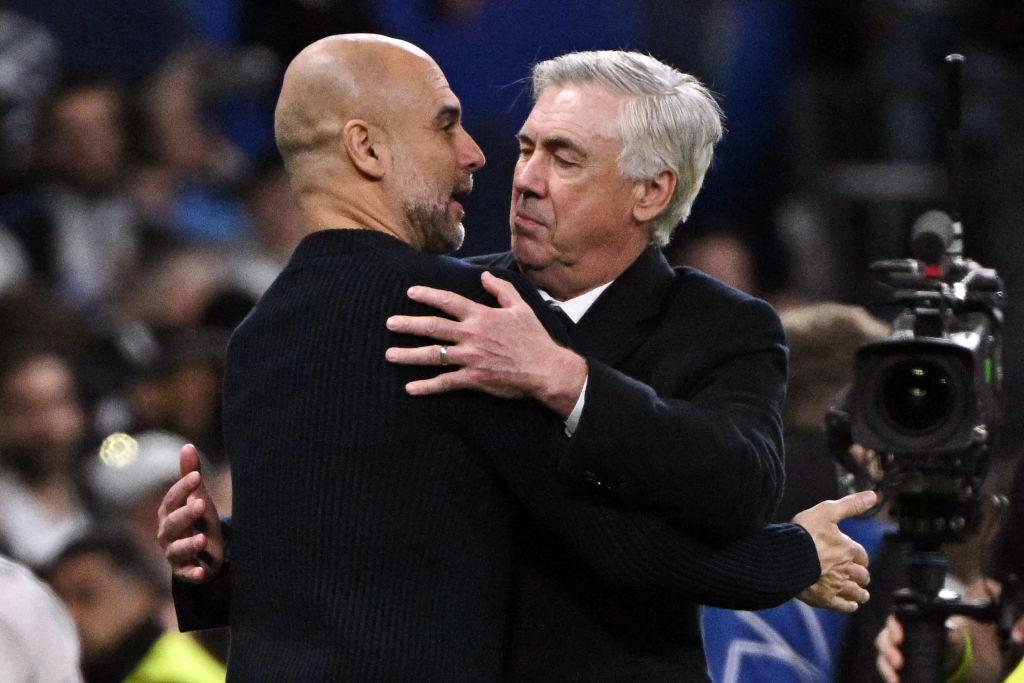Remembered! The absolutely bonkers Boxing Day of 1963
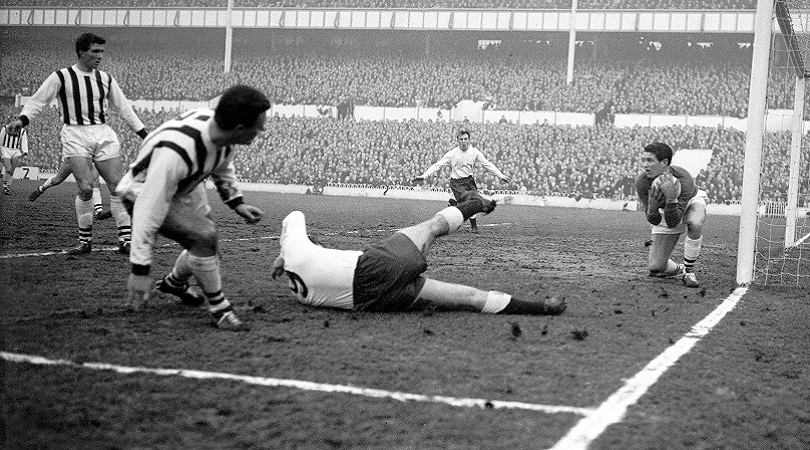
The Christmas cracker of '63
Britain had shivered through the previous winter: the coldest since 1740, with 15-foot snowdrifts. It took 66 days to complete an FA Cup third round blighted by 261 postponements.
Meteorologists predicted more of the same for the winter of 1963/64, but it didn’t happen. Instead there was a blizzard of goals, as the 10 Boxing Day games – Birmingham vs Arsenal was the only postponement – produced an unprecedented and frankly unbelievable 66 goals; you needn’t be Stephen Hawking to calculate that’s an average of 6.6 goals per game. But who were the winners and losers? Read on for the incredible story...
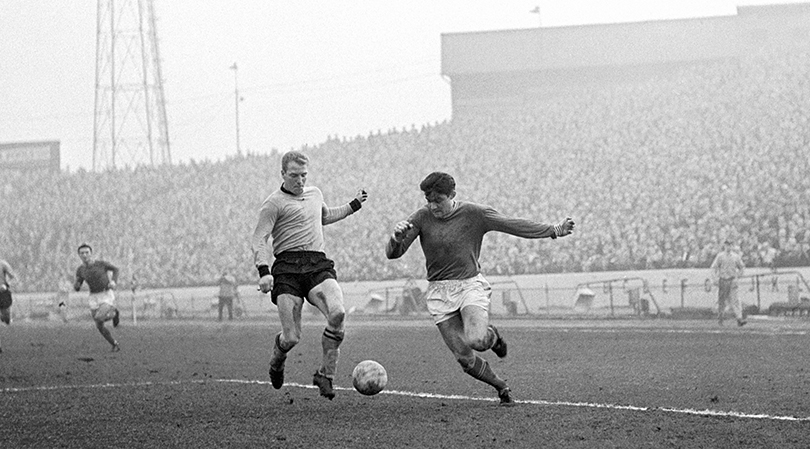
1. Blackpool 1-5 Chelsea
Promoted the previous summer under Tommy Docherty, Chelsea utilised high energy, quick passing and innovative tactics like overlapping full-backs. Many of their players would go on to become household names: goalkeeper Peter Bonetti, centre-back Ron "Chopper" Harris, future record goalscorer Bobby Tambling (pictured) and playmaker captain Terry Venables, all products of the youth system.
They spent Christmas at a seaside hotel and the 20th-placed home side were equally accommodating. Chelsea were 4-0 up by the break – "Everyone could have gone home by half-time," according to the Daily Mirror report – through Albert Murray, Peter Houseman and a Barry Bridges brace. After some Tangerine tactical tweaks, Dave Durie halved the deficit but Venables iced the cake.
A festive fixture feature at the time was that the Boxing Day protagonists would play the same opponents two days later at the other team’s ground. Chelsea won 1-0 at the Bridge and would go on to finish fifth; Blackpool ended up 18th.
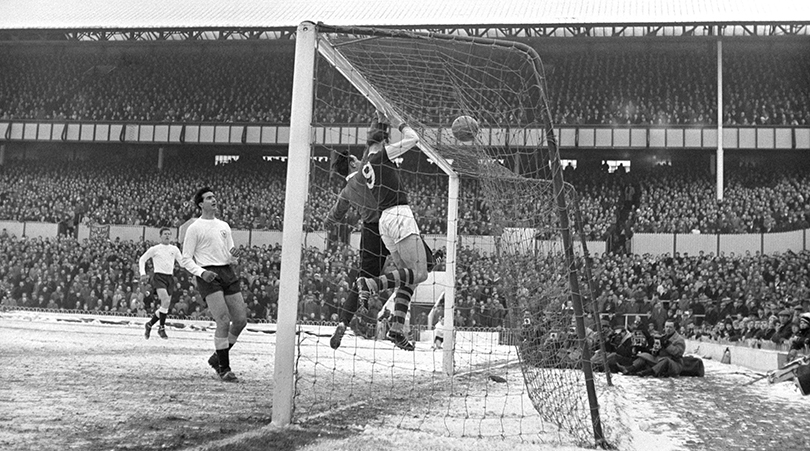
2. Burnley 6-1 Manchester United
United came into the game four positions above ninth-placed Burnley, but in those days the Clarets enjoyed the sort of success to even outshine Sean Dyche. Champions in 1960, they had since finished fourth, second and third; in the same timespan, a United side being rebuilt post-Munich had finished 7th, 7th, 15th and 19th, although they had won the FA Cup in May.
Here, Andy Lochhead (pictured above, No.9) scored early on, and although David Herd equalised, Lochhead’s volley gave Burnley the half-time advantage. Thereafter, the game belonged to their 18-year-old Scottish winger Willie Morgan. Morgan helped himself to a brace while Lochhead completed a four-goal haul and Paddy Crerand was sent off for the visitors. United, who avenged this defeat with a 5-1 win in Manchester two days later, went on to finish second, Burnley ninth – and Morgan moved to Old Trafford in summer 1968.
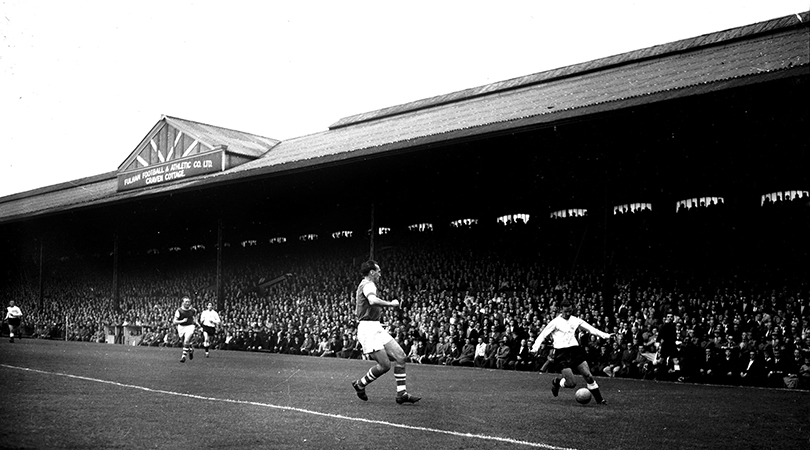
3. Fulham 10-1 Ipswich Town
Eighteen months earlier, freshly-promoted Ipswich had become Football League champions. Their playing staff hadn’t changed much since, but in summer 1963 manager Alf Ramsey was appointed England boss, and frankly Jackie Milburn was no replacement: by Christmas his team were rock-bottom with nine points from 23 games.
Fulham weren’t friendly festive hosts, either. On a Craven Cottage quagmire, Scottish international Graham Leggat (pictured above in white, tormenting Ipswich’s Andy Nelson) scored four, Bobby Howfield bagged a hat-trick and among the other scorers was future England boss Bobby Robson. ''It must have been those lovely turkeys we gave 'em for Christmas,” said fabulously-named Fulham boss Bedford Jezzard. “From now on, they get one every week." Ipswich chairman John Cobbold noted: "It could have gone either way, until the match began."
Two days later, Ipswich got some revenge with a 4-2 win at Portman Road, although that didn’t stop them finishing bottom with an eye-watering 121 goals conceded. Fulham finished 15th. Nobody knows what happened to Alf Ramsey thereafter.
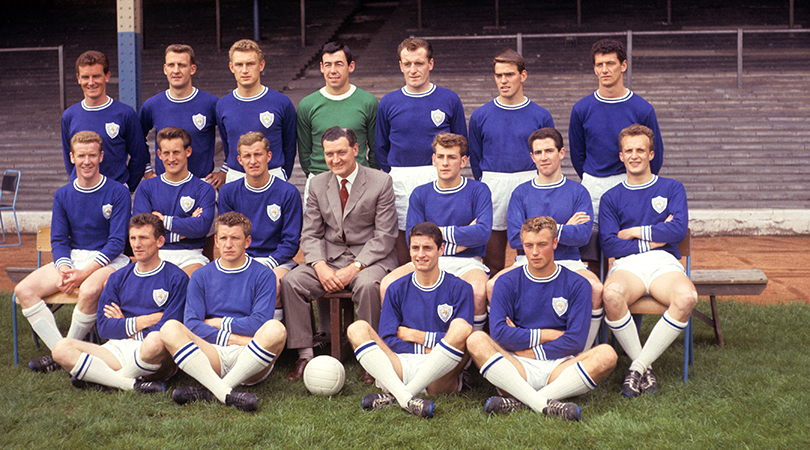
4. Leicester City 2-0 Everton
Until they heard the remarkable scorelines from elsewhere, the happy throngs filing out of Filbert Street might have thought their game would be the day’s big story. Everton were reigning champions, and although they started the day in sixth, 12th-placed Leicester were closer to the bottom three than the Toffees, who had been nicknamed the “Mersey Millionaires” under the ownership of Littlewoods bigwig Sir John Moores.
On this occasion, though, the Foxes outwitted the holders. Ken Keyworth scored both goals while Gordon Banks kept a clean sheet – and did so again in a Goodison return won 3-0 by Leicester, meaning the Toffees were the only top-flight club to draw two festive blanks. The Foxes finished 11th and won the fledgling League Cup, in just its fourth season and still with a two-legged final; Everton came third, and had to hand the title to their bitterest rivals.
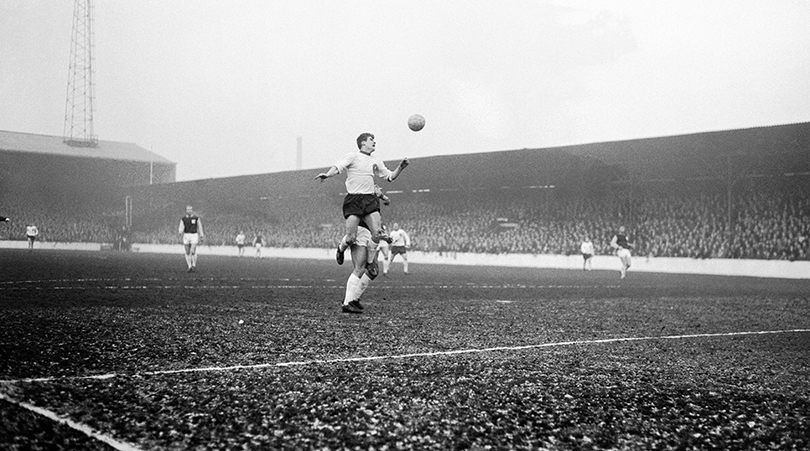
5. Liverpool 6-1 Stoke City
By the first Christmas since Beatlemania, another force was bursting out of Merseyside. Eighteen months after promotion, Bill Shankly had assembled a side that would later this season win their first top-flight title since 1947, and only their second in 40 years; over the next 30, they would take their championship total from five to 18.
By contrast, Stoke’s first top-flight campaign in a decade was a struggle – they spent Christmas in 18th and finished one place higher. At half-time they were only losing to an Ian St John goal, but the hosts took control after the break, with future World Cup winner Roger Hunt scoring four and Alf Arrowsmith (pictured above, in white) joining in.
Perhaps the difference was abstinence from Christmas festivities: "Bill Shankly was adamant that no one would get drunk at that time,” explained St John. “‘You have your Christmas in the summer,' he said. ‘You can over indulge then, if you like'." By then, Hunt had scored 31 league goals, St John 21, Arrowsmith 15, the team a club record 92, and Liverpool were champions.
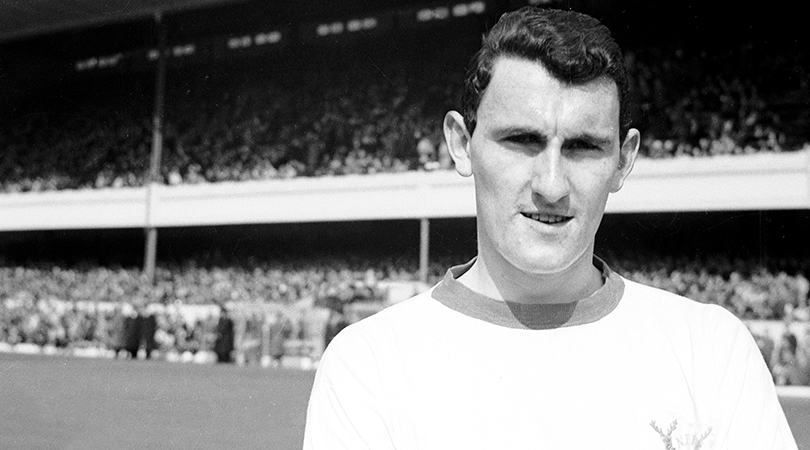
6. Nottingham Forest 3-3 Sheffield United
The previous summer these two teams had finished ninth and 10th, and although the visitors kicked off five positions above their 13th-placed hosts, there was little between them again. Not that this was a tit-for-tat swapping of punches – far from it: this was truly a game of two halves.
Managed by Johnny Carey, who also helmed the national side for his home country of the Republic of Ireland in his spare time, Forest roared into a 3-0 half-time lead through Frank Wignall, Geoff Vowden (pictured) and Ian Storey-Moore. But whatever was said by Sheffield United manager “Gentleman” John Harris at the break worked a treat: they levelled through a double from 18-year-old forward Mick Jones and a goal from Len Allchurch, younger brother of Wales legend Ivor. Forest won the rematch 2-1 but went on to finish directly below 12th-placed United.
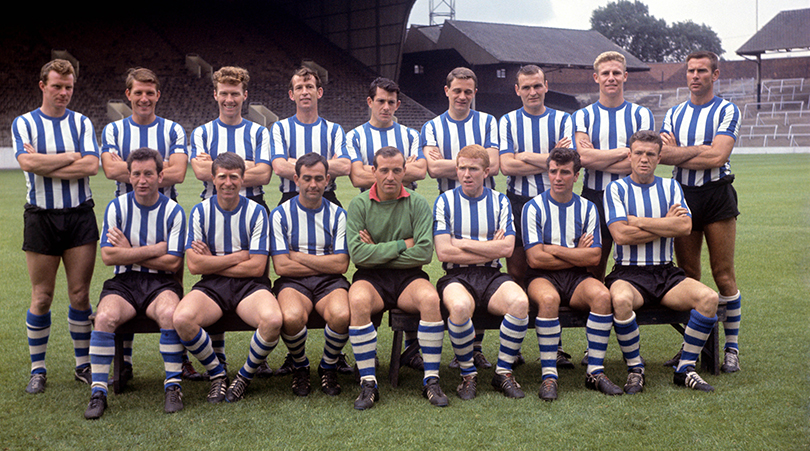
7. Sheffield Wednesday 3-0 Bolton Wanderers
This Hillsborough clash matched up two clubs going in opposite directions. While Wednesday had spent the 1950s bouncing between the top two divisions, Football League founder members Bolton had reached two FA Cup finals – but the early ‘60s saw the Sheffielders established as top-six fixtures while Wanderers were on the wane.
So it wasn’t too much of a surprise that Wednesday, managed by future Barcelona boss Vic Buckingham, won 3-0 through a Colin Dobson brace and one from Mark Pearson. They ended the day in fourth and eventually finished sixth; although Bolton gained immediate revenge with a 3-0 win at Burnden, the Trotters were relegated after almost three decades in the top flight.
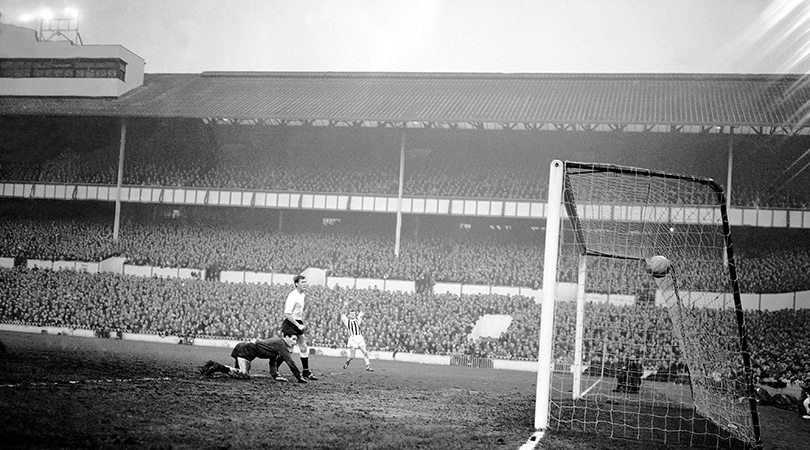
8. West Bromwich Albion 4-4 Tottenham Hotspur
Spurs had finished second in 1962/63 and were only kept off top spot at Christmas by goal difference. By contrast, 10th-placed West Brom’s players had briefly gone on strike days earlier when boss Jimmy Hagan – a Geordie who was sufficiently worldy to spend the '70s managing various Portuguese sides including Benfica and Sporting CP – had insisted the players train in shorts despite freezing conditions.
The game was a see-saw affair. Jimmy Greaves, who later commented on the "rip-roaring atmosphere” from the 34,000 squeezed into The Hawthorns, volleyed Spurs in front and Don Howe – later a groundbreaking coach for Arsenal and England – wafted an early penalty over the bar. Bobby Smith’s 200th league goal doubled the difference, and though John Kaye’s header gave the Baggies a sniff, Cliff Jones restored the two-goal cushion.
Greaves did the same again after Clive Clark’s goal, but this time Tottenham couldn’t hold the lead. The marvellously-monikered Mickey Fudge got one back before Howe made amends with an 80th-minute equaliser. The Baggies won the rematch 2-0 (pictured above) but finished 10th to Spurs’ fourth.
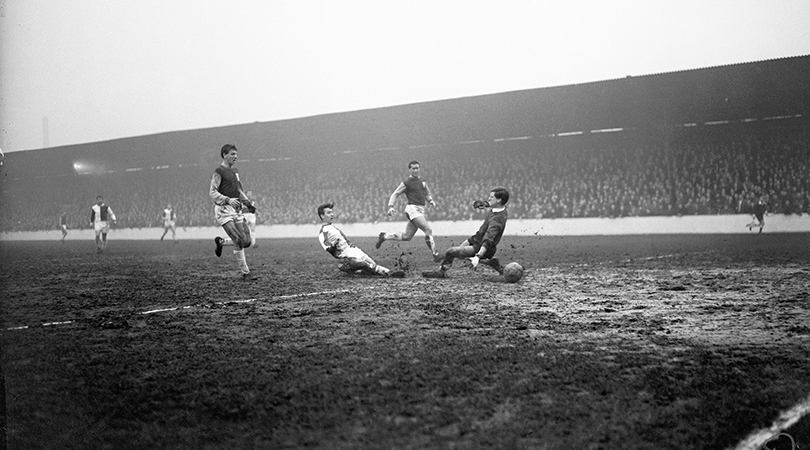
9. West Ham United 2-8 Blackburn Rovers
Top of the league at the 11am kick-off, Rovers certainly made sure they stayed there until the mince pies were done. “Jolly” Jack Marshall’s side clearly liked playing London teams: they’d beaten Spurs 7-2 and Arsenal 4-1, both up at Ewood, and on a rain-lashed pudding of an Upton Park pitch they showed no mercy to a West Ham team who hadn’t won since November 2. This became their record home defeat.
According to legendary Guardian writer Albert Barham, "Everything West Ham did was tinged with misfortune. Everything Blackburn did was coldly calculated and correct." Fred Pickering and Andy McEvoy bagged hat-tricks, with Mike Ferguson and Bryan Douglas joining in. Johnny Byrne’s double was the only consolation for the majority of the 20,500 spectators, but they did give Blackburn a standing ovation – and those who made the long trip north for the return two days later were rewarded with a 3-1 win after future England manager Ron Greenwood dropped young Martin Peters for the rather more robust Eddie Bovington.
By mid-January Blackburn were off top spot, never to return until the Jack Walker years; West Ham would end the season by winning the FA Cup.
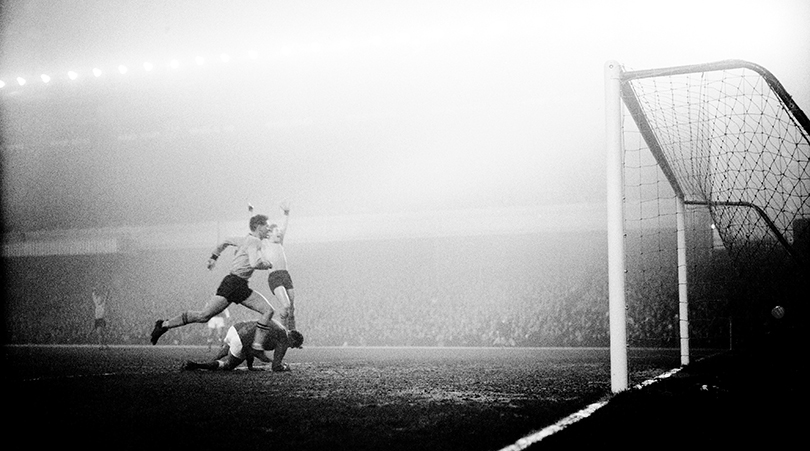
10. Wolverhampton Wanderers 3-3 Aston Villa
Legendary Wolves manager Stan Cullis was in the final year of his reign – he would be sacked in September 1964 after more than 16 years – and his team had started this campaign awfully by taking four points from the first eight games. They’d rallied and were 14th by Christmas, but the 60,000-capacity Molineux was still less than half-full for this clash with 17th-placed local rivals Villa, managed by genial Joe Mercer – born a fortnight after the start of World War One, and later to manage Manchester City and, as caretaker, England.
Those who did bother to turn up might have wished they hadn’t after a goalless first half, but things certainly improved after the turnaround as the teams fought out a six-goal thriller. (Two days later, they were again inseparable in a 2-2 at Villa Park.) Terry Wharton and Ray Crawford (with two – pictured above left) scored for the Old Golds, but Villa matched them blow for blow. Their goals came from Dave Pountney, Welsh wing-half Vic Crowe and Tony Hateley, whose son Mark would score at the Maracana for England.

Greg Lea is a freelance football journalist who's filled in wherever FourFourTwo needs him since 2014. He became a Crystal Palace fan after watching a 1-0 loss to Port Vale in 1998, and once got on the scoresheet in a primary school game against Wilfried Zaha's Whitehorse Manor (an own goal in an 8-0 defeat).
